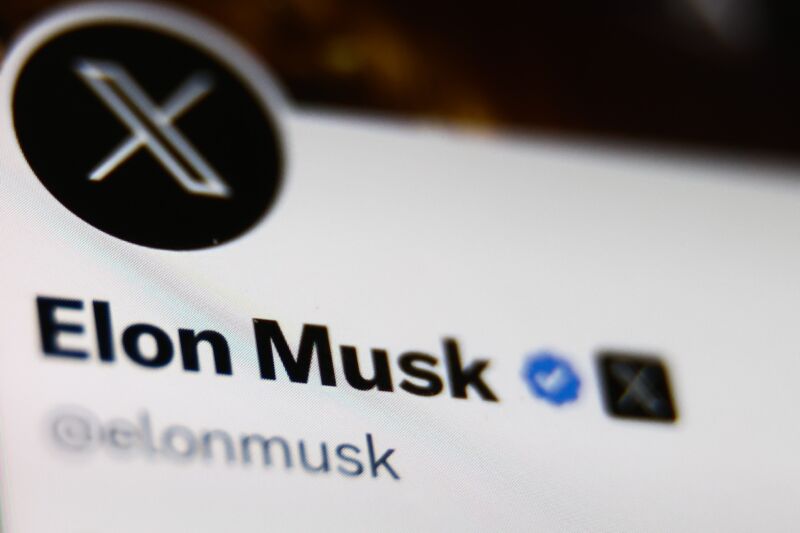Blue checkmarks —
Paid “verification” deceives X users and violates Digital Services Act, EU says.

Getty Images | NurPhoto
Elon Musk’s overhaul of the Twitter verification system deceives users and violates the Digital Services Act, the European Commission said today in an announcement of preliminary findings that could lead to a big financial penalty.
The social media platform now called X “designs and operates its interface for the ‘verified accounts’ with the ‘Blue checkmark’ in a way that does not correspond to industry practice and deceives users,” the EU regulator said. “Since anyone can subscribe to obtain such a ‘verified’ status, it negatively affects users’ ability to make free and informed decisions about the authenticity of the accounts and the content they interact with. There is evidence of motivated malicious actors abusing the ‘verified account’ to deceive users.”
Blue checkmarks “used to mean trustworthy sources of information,” Commissioner for Internal Market Thierry Breton said. The EC said it “informed X of its preliminary view that it is in breach of the Digital Services Act (DSA) in areas linked to dark patterns, advertising transparency and data access for researchers.”
X will have an opportunity to respond in writing. If the preliminary finding is upheld, the EC said it would adopt a non-compliance decision that “could entail fines of up to 6 percent of the total worldwide annual turnover of the provider, and order the provider to take measures to address the breach.”
A non-compliance decision may also “trigger an enhanced supervision period to ensure compliance with the measures the provider intends to take to remedy the breach,” and “periodic penalty payments to compel a platform to comply.” X is allowed to “exercise its rights of defense by examining the documents in the Commission’s investigation file and by replying in writing to the Commission’s preliminary findings,” the announcement said.
We contacted X today and will update this article if the company provides a response to the EU findings.
Advertising and data access charges
As for the second alleged violation, the EC said that “X does not comply with the required transparency on advertising, as it does not provide a searchable and reliable advertisement repository, but instead put in place design features and access barriers that make the repository unfit for its transparency purpose towards users. In particular, the design does not allow for the required supervision and research into emerging risks brought about by the distribution of advertising online.”
Thirdly, the commission said it found that “X fails to provide access to its public data to researchers in line with the conditions set out in the DSA. In particular, X prohibits eligible researchers from independently accessing its public data, such as by scraping, as stated in its terms of service. In addition, X’s process to grant eligible researchers access to its application programming interface (API) appears to dissuade researchers from carrying out their research projects or leave them with no other choice than to pay disproportionately high fees.”
In December 2023, the EC announced that Musk’s X platform was subject to the first formal investigation into possible DSA violations. X said at the time that it “remains committed to complying with the Digital Services Act and is cooperating with the regulatory process. It is important that this process remains free of political influence and follows the law.”
With today’s announcement, X is the first company to face preliminary findings of DSA non-compliance.
“The DSA has transparency at its very core, and we are determined to ensure that all platforms, including X, comply with EU legislation,” said EC competition official Margrethe Vestager.